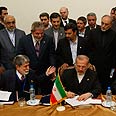
West to continue working on sanctions
Diplomats in Washington and New York unimpressed by Iranian fuel swap deal brokered by Turkey and Brazil, tell Ynet that Security Council discussions will go on. Russia expected to support punitive measures
In Israel, after expressing concern over the developments, Prime Minister Benjamin Netanyahu has instructed his ministers not to comment on the matter.
The American administration – with the support of France, Britain and apparently also Russia – is continuing to push for a Security Council resolution. Western diplomats in Washington and New York told Ynet on Monday night that "the discussions on sanctions continue".
The White House on Monday showed deep skepticism about Iran's new deal, saying it has the chance to be "positive step" but warning that the deal still allows Iran to keep enriching uranium toward the pursuit of a nuclear weapon.
"Given Iran's repeated failure to live up to its own commitments, and the need to address fundamental issues related to Iran's nuclear program, the United States and international community continue to have serious concerns," White House press secretary Robert Gibbs said in a written statement to the media.
He said that Iran still must make clear that its nuclear program is intended only for peaceful purposes "or face consequences, including sanctions."

Celebrating agreement. Turkish, Iranian and Brazilian leaders (Photo: AP)
The White House spokesman added that the declaration issued out of Tehran is also vague about Iran's willingness to meet as promised with the set of countries working to resolve the nuclear standoff.
Iran's decision to continue its program to enrich uranium to near 20% is a direction violation of existing UN Security Council resolutions, Gibbs said.
Questioned later in a briefing with reporters, Gibbs said the deal does nothing to change the steps, or timing, of the US pursuit of international sanctions against Iran. He said Iran's proposal is less than what it agreed to last October — a deal never came to fruition.
"The words and the deeds of the Iranian leadership rarely coincide," Gibbs said.
He said Iran must submit its proposal to the International Atomic Energy Agency for formal consideration.
After the five permanent Security Council members and Germany have reached an agreement on the sanctions, they will soon launch efforts to persuade the 10 non-permanent Security Council members. Turkey, Brazil and Lebanon are three members that object to sanctions against Iran.
Western diplomats in New York estimate that Russia will continue to cooperate with the United States, Britain and France, with the biggest doubts being China's response. According to the estimates, Russia – which was a main elements in the deal reached in October for the shipment of 75% of Iran's enriched uranium to Moscow – has been hurt by the Iranian rejection of the agreement.
The October deal was based on the assumption that shipping most of the low-enriched uranium from Iran would postpone the nuclear project by one year. Since then, Iran has continued to enrich uranium. The acceptance of the agreement means that the Iranian nuclear capabilities will be delayed by half a year.
Western officials are skeptical about the timetable, in light of the uncertainty over the Iranian offer. The West fears that the Iranian move may lead to a delay in the American efforts to vote on the sanctions next month.
Nuclear program still a concern
Russian President Dmitry Medvedev cautiously welcomed the agreement but added that the deal may fail to fully satisfy the international community.
"As far as I understand from some Iranian official statements, it will continue such work. In that case, the international community's concerns could remain," he said during a trip to Ukraine.
The United Nations expressed similar feelings, saying that Iran's nuclear fuel talks brokered by Turkey and Brazil were "encouraging". UN chief Ban Ki-moon's spokesman Martin Nesirky said, however, that Tehran must comply with Security Council resolutions, that demanded a suspension of its uranium enrichment plan.
And in Jerusalem? Before the silence, there was an expression of concern. A senior official said that Iran "manipulated Turkey and Brazil and is pretending to accept the agreement." According to Israeli officials, the deal is for the sake of appearance only.
Attila Somfalvi, The Associated Press and Reuters contributed to this report










